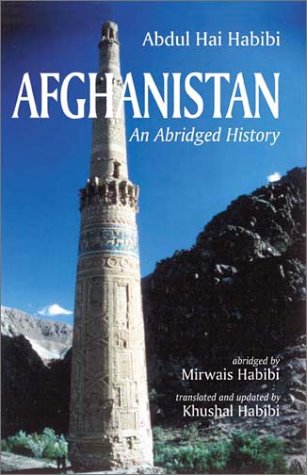Afghanistan: An Abridged History - Softcover

"synopsis" may belong to another edition of this title.
Alexander of Macedonia came and passed through Afghanistan and left his imprint through the Graeco- Bactrian empire, which ruled for nearly two centuries. The marauding Arab armies came in the seventh century, captured large areas by the force of the sword and converted the mountain-dwelling people to Islam. The people resisted the Arab invaders for two centuries before embracing their religion. The independence movement continued together with the rebuilding of society. A few centuries later the notorious Genghis Khan laid to waste everything in his path. After conquering a city or fortress he burned the place to ashes. In his vengeance, Genghis destroyed countless centers of learning and libraries. Tamerlane, who was of the same lineage as Genghis, also marauded the Afghan soil. His descendents, however, were men of knowledge and rebuilt what their ancestors had laid to waste. Herat became the center of renaissance where numerous scholars were nurtured.
Intrigue and discord among various rulers, warlords and family members highlight the history of Afghanistan up to this day. No wonder a fratricidal war marked the end of the twentieth century in the country. This war, festered by international and regional rivalries, was a dark phase in the tormented history of the Afghan nation with devastating effects to its people. Over a million Afghans succumbed to factional warfare, flickers of which continue to inflame.
As president of the Afghan Historical Society, Professor Abdul Hai Habibi started writing a history of Afghanistan in 1966. A year later the first volume of A Short History of Afghanistan was published. The second volume was completed a year later, in 1968.
For a long time the need to publish an abridged history of Afghanistan has been felt. The task of abridging Professor Habibi’s A Short History of Afghanistan was undertaken by Mirwais Habibi, and I translated it to English. The original book covers the country’s history up to 1919—the start of the war of independence. Due to difficulties at the time the book was being written, Professor Habibi did not elucidate the period of Nader Shah and his son, Zaher Shah. I have added historical developments following that period.
"About this title" may belong to another edition of this title.
- PublisherFenestra Books
- Publication date2003
- ISBN 10 1587361698
- ISBN 13 9781587361692
- BindingPaperback
- Number of pages168
Shipping:
US$ 5.93
From United Kingdom to U.S.A.
Top Search Results from the AbeBooks Marketplace
Afghanistan: An Abridged History
Book Description Paperback. Condition: Very Good. The book has been read, but is in excellent condition. Pages are intact and not marred by notes or highlighting. The spine remains undamaged. Seller Inventory # GOR013329522

